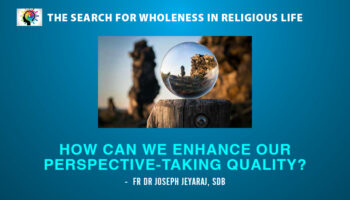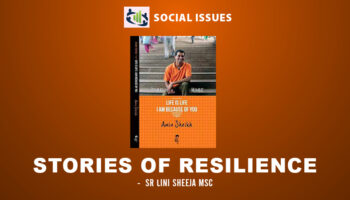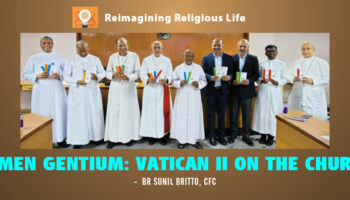The Church needs holy, healthy and humble priests, and that requires careful selection and training of candidates. In fact, the Church considers the formation of future priests, both diocesan and religious, as one of her most important and demanding tasks. In December 2016, the Vatican brought out a new set of guidelines for the formation of seminarians, entitled The Gift of the Priestly Vocation. The salient features of this document are given below. Although the document is directly about the formation of priests, most of the guidelines are valid for any person doing ministry in the church, such as religious and lay leaders. (The numbers in brackets refer to the paragraph numbers in the document.)
INITIAL FORMATION
The period of initial formation begins when a candidate enters the seminary and it goes on till he is ordained a priest. The new document visualises initial formation as a journey in four stages: 1) the Propaedeutic or Preparatory Stage; 2) the Discipleship Stage (the period of philosophical studies); 3) the Configuration Stage (the period of theological studies); and 4) the Pastoral Stage (the period of vocational synthesis).
- The Preparatory (Propaedeutic) Stage
The present document makes the propaedeutic or preparatory stage mandatory for all those who wish to enter seminaries. In India it has already been the practice for many decades and it is often referred to as the “minor seminary” stage. It gives the aspirant a chance to acquire an initial and overall familiarity with Christian doctrine. It is a time of serious vocational discernment and growth in spiritual life. It is to be lived in a community, distinct from the major seminary, with its own programme and its own team of formators.
- The Stage of Discipleship (philosophical studies)
The disciple is one whom the Lord has called to “stay with Him” (Mk 3:14), to learn the secrets of the Kingdom of God, and to live in a deep relationship with Him. In this stage, special attention is given to the human dimension of formation, emphasising systematic work on the personality of the seminarian (62). The lack of a well-structured and balanced personality would be a serious hindrance to the continuation of formation for the priesthood (63). This is the stage to work towards a solid physical, psycho-affective and social maturity required of a priest.
- The Stage of Configuration to Christ (Theological Studies)
Here the focus is on the configuration of the seminarian to Christ. It demands that the seminarian enter profoundly into the contemplation of the person of Jesus Christ, making the relationship with Christ more intimate and personal (68). This stage allows the gradual grounding of the seminarian in the likeness of the Good Shepherd, who knows his sheep, gives his life for them, and seeks out the ones that have wandered from the fold.
- The Stage of Vocational Synthesis (Pastoral Stage)
This stage begins with the Order of Diaconate. At this stage, the seminarian leaves the seminary and launches his pastoral life. During this stage, the candidate is asked to declare freely, consciously and definitively his intention to be a priest, having received diaconal ordination (74). This stage will normally take place outside the seminary, at least for a significant period.
DIMENSIONS OF FORMATION
In each of the above four stages, the process of formation has four dimensions, namely: Human Dimension, Spiritual Dimension, Intellectual Dimension and Pastoral Dimension.
Human Formation
The objective of human formation is to help seminarians become humanly balanced, serene and stable. Only in this way will it be possible to have priests with friendly traits, who are authentic, loyal, interiorly free, affectively stable, capable of weaving together peaceful interpersonal relationships and living the evangelical counsels without rigidity, hypocrisy or loopholes.
Human formation is the foundation of all priestly formation, and it promotes the integral growth of the person. Psychologically, it focuses on acquiring a stable personality, characterized by emotional balance, self-control and a well-integrated sexuality. Developing an aesthetic sense (sense of beauty) is also part of human formation.
A sign of the harmonious development of the personality is a mature capacity for relations with men and women of various ages and social conditions.
Spiritual Formation
Spiritual formation is all about establishing a deep personal relationship with God. It is nourished by prolonged and silent prayer (102). Some practical steps that the document proposes for nurturing spiritual life are: the practice of Lectio Divina, which consists in a prayerful reading and profound meditation on the Word of God (103), a living faith in the Eucharist and daily participation in it (104), the Liturgy of the Hours, frequent and regular celebration of the sacrament of Penance (106), the practice of asceticism and interior discipline, and spiritual direction, which is a privileged means for the integral growth of the person (107).
The evangelical counsels too have an important role in the spirituality of the priest. Following the Master with faith and freedom of heart,  the seminarian learns to make a gift of his own will by obedience to the service of God and their fellow men (109).
the seminarian learns to make a gift of his own will by obedience to the service of God and their fellow men (109).
Those who prepare for priesthood in the Latin Church ought to recognise and welcome celibacy as a special gift of God (110). It would be gravely imprudent to admit to the sacrament of Orders a seminarian who does not enjoy free and serene affective maturity (110).
Seminarians should cultivate the spirit of poverty in practical ways (111). They should be formed to imitate Christ, who “became poor although he was rich” in order to enrich us. They should have a special place in their hearts for the poorest and weakest. They ought to be witnesses to poverty through simplicity and austerity of life, so as to become sincere and credible promoters of true social justice. (111).
Intellectual Formation
Intellectual formation is aimed at achieving a solid competence in philosophy and theology, along with a general educational preparation, enough to allow them to proclaim the Gospel message to the people of our own day in a way that is credible and can be understood. It seeks to enable them to enter into fruitful dialogue with the contemporary world. As Vatican II stated, the knowledge of philosophy and theology helps us to hear, distinguish and interpret the many voices of our age, and to judge them in the light of divine word, so that revealed truth can always be more deeply penetrated, better understood and set forth to great advantage (116).
Pastoral Formation
Priestly formation must always be permeated by a pastoral spirit. Formation should make future priests experts in the art of pastoral discernment, that is, the ability to listen deeply to real situations and capable of good judgement in making choices and decisions (120). The gaze of the Good Shepherd who seeks out, walks alongside and leads his sheep, will form a serene, prudent and compassionate outlook in him. Priestly ministry means, as Pope Francis says, being shepherds ‘with the smell of the sheep,’ who live in their midst to bring the mercy of God to them.
Special attention must also be given to preparing seminarians for the particular requirement and methods of pastoral accompaniment for children, young people, the sick, the elderly, the disabled, those who live in situations of isolation or poverty. The pastoral care of families should receive special attention (124).
Special attention is to be given to the homily, since it is the touchstone for judging a pastor’s closeness and ability to communicate to his people (177).
ONGOING FORMATION
The Ongoing Formation begins from the time one is ordained a priest and goes on till the end of his life. It is intended to ensure fidelity to the priestly ministry in a continuing journey of conversion, in order to rekindle the gift received at ordination (81). The priest himself is primarily responsible for his own ongoing formation. It is the bishop’s responsibility to ensure that newly ordained priests are not immersed in excessively burdensome or delicate situations. It is good to set up a system of personal accompaniment of young priests to promote and maintain the quality of their ministry and to help them to meet their first pastoral challenges with joy and enthusiasm.

To subscribe to the magazine Contact Us





